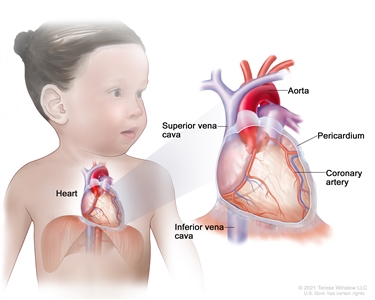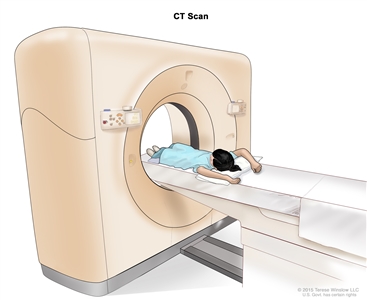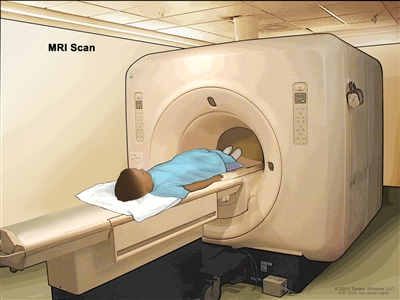Types of treatment for childhood heart tumors
Who treats children with heart tumors?
A pediatric oncologist, a doctor who specializes in treating children with cancer, oversees treatment of heart tumors. The pediatric oncologist works with other health care providers who are experts in treating children with cancer and who specialize in certain areas of medicine. Other specialists may include:
- pediatrician
- pediatric heart surgeon
- pediatric cardiologist
- radiation oncologist
- pathologist
- pediatric nurse specialist
- social worker
- rehabilitation specialist
- psychologist
- child-life specialist
There are different types of treatment for children and adolescents with heart tumors. You and your child's care team will work together to decide treatment. Many factors will be considered, such as your child's overall health and whether the tumor is newly diagnosed or has come back.
Your child's treatment plan will include information about the tumor, the goals of treatment, treatment options, and the possible side effects. It will be helpful to talk with your child's care team before treatment begins about what to expect. For help every step of the way, see our booklet, Children with Cancer: A Guide for Parents.
Watchful waiting
Watchful waiting is closely monitoring a child's condition without giving any treatment until signs or symptoms appear or change. This treatment may be used for rhabdomyoma (a benign tumor).
Surgery
When possible, the tumor is removed by surgery. Types of surgery that may be done include:
- Surgery to remove the tumor and some healthy tissue around it.
- Heart transplant. If the child is waiting for a donated heart, they may receive other treatment as needed.
Sometimes chemotherapy may be given before surgery to make a cancerous tumor smaller and decrease the amount of tissue that needs to be removed during surgery. This is called neoadjuvant (preoperative) therapy.
Chemotherapy
Chemotherapy (also called chemo) uses drugs to stop the growth of cancer cells. Chemotherapy either kills the cancer cells or stops them from dividing. For children with sarcoma, chemotherapy may be given alone or with other types of treatment to reduce the size of the tumor before surgery.
Learn more about Chemotherapy to Treat Cancer.
Radiation therapy
Radiation therapy uses high-energy x-rays or other types of radiation to kill cancer cells or keep them from growing. Cancerous heart tumors are sometimes treated with external beam radiation therapy. External beam radiation therapy uses a machine outside the body to send radiation toward the area of the body with cancer. Radiation therapy may be used when the cancer cannot be removed by surgery.
Learn more about External Beam Radiation Therapy for Cancer and Radiation Therapy Side Effects.
Targeted therapy
Targeted therapy uses drugs or other substances to block the action of specific enzymes, proteins, or other molecules involved in the growth of tumor cells.
Targeted therapies used to treat benign heart tumors include:
Learn more about Targeted Therapy to Treat Cancer.
Clinical trials
For some children, joining a clinical trial may be an option. There are different types of clinical trials for childhood cancer. For example, a treatment trial tests new treatments or new ways of using current treatments. Supportive care and palliative care trials look at ways to improve quality of life, especially for those who have side effects from cancer and its treatment.
You can use the clinical trial search to find NCI-supported cancer clinical trials accepting participants. The search allows you to filter trials based on the type of cancer, your child's age, and where the trials are being done. Clinical trials supported by other organizations can be found on the ClinicalTrials.gov website.
Learn more about clinical trials, including how to find and join one, at Clinical Trials Information for Patients and Caregivers.
Treatment of childhood heart tumors
Treatment of newly diagnosed childhood heart tumors may include:
- watchful waiting for children with rhabdomyoma (a benign tumor), which sometimes shrinks and goes away on its own
- targeted therapy (everolimus or sirolimus) for children with rhabdomyoma or tuberous sclerosis
- chemotherapy followed by surgery (which may include removing some or all of the tumor or a heart transplant) for children with sarcomas
- surgery to completely remove the tumor for children with other types of heart tumors
- radiation therapy for children with cancerous tumors that cannot be removed by surgery
If a cancerous tumor comes back after treatment, your child's doctor will talk with you about what to expect and possible next steps. There may be treatment options that could shrink the tumor or control its growth. If there are no treatments, your child can receive care to control symptoms from cancer so they can be as comfortable as possible.


